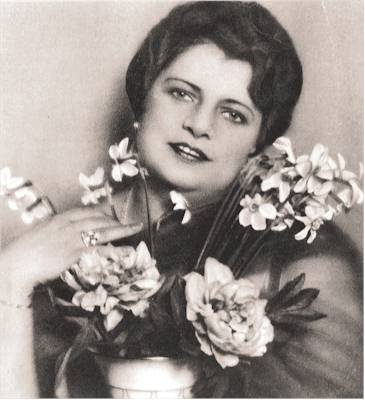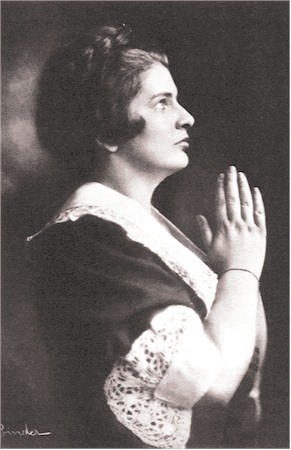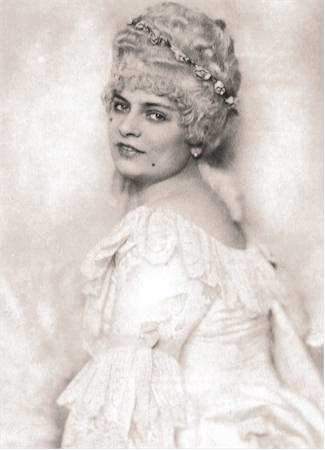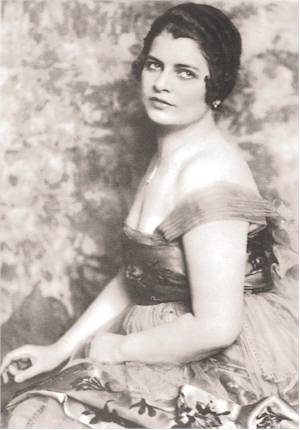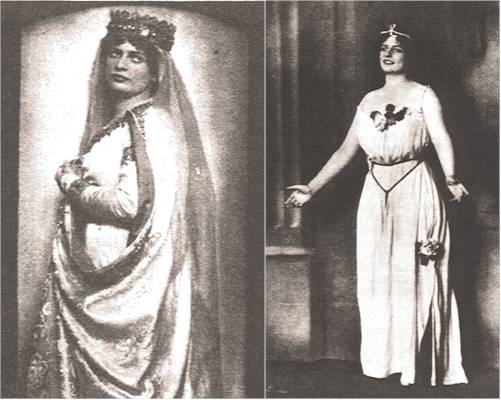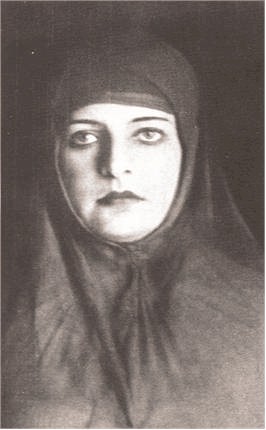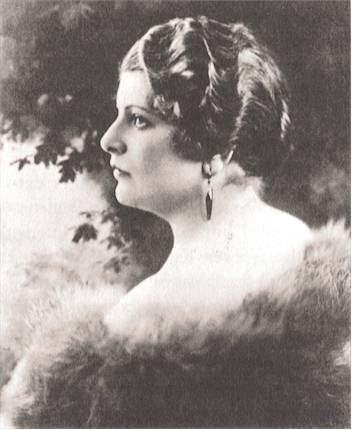German soprano, 1895 - 1929
Biographical notes:
She was born in Berlin and was the daughter of a police officer and received vocal tuition by Nikolaus Rothmühl and Ernst Grenzebach. After an audition in 1918 she was immediately engaged
at the German Opera in Berlin-Charlottenburg. Singing lyric roles in the next seven years, her voice matured, and she also appeared in more dramatic roles. Like many other German singers of
the post-war era, she tried to get an engagement in the United States. When the Manhattan Opera House started a “German Company” in 1923/24, she and other German artists, such as Friedrich Schorr,
Alexander Kipnis, Robert Hutt, Friedrich Plaschke and Elsa Alsen, toured
North America. She was tremendously successful as Eva. In November 1924 she gave a guest performance in Dresden as Marguerite which led to a permanent engagement there. Together
with singers like Tino Pattiera, Ivar Andrésen and Robert Burg she played an important part in the Verdi Renaissance that started in Dresden in the 1920s. Her most successful achievements:
Leonore in Franz Werfel’s German version of La Forza del Destino, Aida, Desdemona, Tosca, Mimì, Madame Butterfly and Marguerite. She added Maddalena in Andrea Chénier and Manon
Lescaut to her repertoire. Her partner in all these roles was the passionate Tino Pattiera with whom she recorded several duets. In 1929 Meta Seinemeyer was invited to sing at Covent Garden
as Sieglinde, Eva and Elsa. Soon after her return from London she fell seriously ill with leukemia. On her deathbed she married the conductor and pianist Frieder Weissmann, with whom she had
often worked in recitals and recordings.
As Agathe
As the Countess in “Le Nozze di Figaro”
Postcard (1928) “She would undoubtedly have gone on to become the most important German spinto of her time. It seems quite conceivable that in due corse her voice would have matured sufficiently for her to have become the ideal Isolde or Brünnhilde...” Clemens Höslinger
Meta Seinemeyer in “Tannhäuser”: Elisabeth (left) and Venus (right)
As Leonora in “La Forza del Destino” My favorite recordings (all by Parlophone): - Von Blut gerötet war meine Schwelle (Maddalena in Andrea Chénier / Giordano / 1925) - Nur der Schönheit weiht’ ich mein Leben (Title role in Tosca / Puccini / 1926) - Sie sass mit Leide auf öder Weide (Desdemona in Otello / Verdi / 1926) - Wie nahte mir der Schlummer (Agathe in Der Freischütz / Weber / 1926) - Und ob die Wolke sie verhülle (Agathe in Der Freischütz / Weber / 1926) - Als Sieger kehre heim (Title role in Aida / Verdi / 1926) - Son giunta! Grazie o Dio (Leonora in La Forza del Destino / Verdi / 1927)
- Tu che le vanità conoscesti del mondo (Elisabetta in Don Carlos / Verdi / 1927) - Mild und leise, wie er lächelt (Isolde in Tristan und Isolde / Wagner / 1928) - Otello: Già nella notte densa with Tino Pattiera (Isolde in Tristan und Isolde / Wagner / 1928) - Ancora un passo or via (Cio-Cio-San in Madame Butterfly / Puccini / 1928) - Vissi d’arte (Title role in Tosca / Puccini / 1928) - Un bel dì vedremo (Cio-Cio-San in Madame Butterfly / Puccini / 1928) - La mamma morta (Maddalena in Andrea Chénier / Giordano / 1928) - Hier ist der grauenvolle Ort (Amelia in Un Ballo in Maschera / Verdi / 1929) - Der Männer Sippe sass hier im Saal with Kurt Taucher (Sieglinde in Die Walküre / Wagner / 1929)
She recorded frequently with Tino Pattiera, Robert Burg, Ivar Andrésen, Helene Jung, Johannes Scheurich, Gustav Werner and Carl Martin Oehmann. A wrong playing-speed
affects Meta Seinemeyer’s voice more seriously than most. She had a kind of vibrato which had quite a quick pulse. It was perfectly regular and part of the resonance of a
healthy voice, but when placed close to the microphone it can be obtrusive (CD 4 on the Preiser set).
”Meta Seinemeyer, whose early death was much lamented, was not only a superb Leonora [La Forza del Destino], she excelled in all roles requiring an emotional, lyric-dramatic ability. In Giordano’s Andrea Chénier she was a most poignant Madeleine. Although the technical finish of her voice, which so closely resembled Elisabeth Rethberg’s, was not the latter’s equal, it nevertheless had an incomparable emotional impact - in fact it was a true “voix de larme”. No tombstone inscription could be more apt than the final words from the German translation of La Forza del Destino: “Die Seele lebt” - the soul lives on.” Fritz Busch
|
||||||||||||||||||||||
